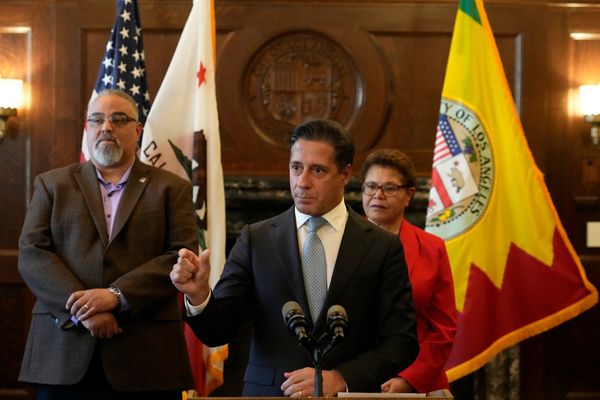
As CEO of OpenAI, Sam Altman wants to make history by developing the world’s first artificial general intelligence, or AGI—a machine powerful enough to think and reason like a human. But some are starting to worry whether he can be trusted not to accidentally create an AI overlord that views humans as a lower life form.
Speaking this weekend at the Aspen Ideas Festival, media tycoon Ari Emanuel recalled a conversation he had with Elon Musk, a former director of his billion-dollar entertainment company, Endeavor.
The anecdote highlighted the awesome stakes involved as companies race to build ever-smarter neural networks.
“Elon said to me once—this scared me—he said: ‘You know, Ari, your relationship with your dogs? … Think about it the following way: You’re the dog to the AI,’” Emanuel told the audience. “I don’t want to be a dog.”
AI experts such as Geoffrey Hinton fear Silicon Valley executives won’t stop at just AGI: Mankind could ultimately create an artificial superintelligence (ASI).
This ASI would not just mimic human learning processes like current transformer-based neural networks such as OpenAI’s GPT-4, but could potentially gain self-awareness in the process—relegating humanity to the second-most advanced species on earth.
With so much riding on Altman’s ability to make the responsible decision, Emanuel fears past behavior suggests he can’t be trusted to properly develop groundbreaking technology—especially given a growing chorus of critics.
“I think he’s a con man,” said Emanuel. “Elon gave him a lot of money—it was supposed to be a nonprofit, now he’s making a lot of money. I don’t know why I would trust him. I don’t know why we would trust these people.” (According to legal filings, Musk contributed more than $44 million into OpenAI between 2016 and September 2020.)
Emanuel said Altman has not done enough to prove the technology doesn’t pose a long-term threat to society, especially since the latter seems to prioritize commercialization over safety.
“You’re telling me you’ve done the calculation, and the good outweighs the bad,” said Emanuel, whose media business could be hurt by generative AI such as OpenAI’s Sora. “Really? I don’t think so.”
OpenAI did not respond to a request from Fortune for comment.
For his part Altman, who has in the past stated offering equity was necessary in part to attract and retain talent, himself said a year ago that people should not place their trust in any one AI company or CEO without evidence that trust is deserved.
Could the AI future mean a society with no purpose?
The OpenAI boss—who is worth $2 billion according to Bloomberg—survived a boardroom mutiny in November thanks in part to Microsoft CEO Satya Nadella, and returned more powerful than ever with three of the four former plotters against him leaving the company.
One of those former directors, Helen Toner, in May justified the coup by citing a pattern of dishonest behavior, saying Altman would withhold information, misrepresent things, and sometimes even outright lie to the board.
At the same time, scientists at OpenAI such as Jan Leike left the company after accusing Altman of breaking a key promise to fund his research. Leike and chief scientist Ilya Sutskever were supposed to design safety protocols robust enough to ensure AI cannot ever gain the upper hand over humans.
Altman himself is now mingling his commercial responsibility as CEO with a new role heading up AI safety at the company—raising eyebrows from a governance perspective.
Twitter founder Jack Dorsey has also sounded the alarm, warning the damage done to human behavior by the very engagement-focused algorithms he himself helped to create could pale when compared with artificial intelligence.
All of this has given Emanuel pause about the AI future.
“I don’t want to stifle innovation, because I do think we need AI, but we have to have the rails around it,” Emanuel said in Aspen this weekend, where Altman was also speaking. “What is society going to be like in that world when there’s no purpose?”
Who is Ari Emanuel?
The younger brother of Rahm Emanuel—former chief of staff to President Barack Obama—Ari Emanuel is often referred to as a Hollywood super agent having represented stars like Martin Scorsese, but he’s an entrepreneur in every sense of the word.
In 1995, the senior partner at talent reps International Creative Management founded Endeavor Agency, transforming it into a fully-fledged media and entertainment empire that went public on the stock exchange in April 2021.
Among his close friends and business associates he counts Hollywood star Dwayne “The Rock” Johnson, UFC boss Dana White, and Tesla CEO Elon Musk, who briefly served as a director on Endeavor’s board.
Emanuel played host to the powerful tycoon in Greece, when unflattering pictures of Musk emerged next to a leaner Emanuel. The images prompted so much online ridicule that Musk reportedly began taking Wegovy just to lose the fat.
Altman and Musk, on the other hand, are far from cozy. Despite cochairing OpenAI at its inception in 2015, Musk departed the organization in 2018. Since then a war of words—and products—has ensued, with the Tesla CEO attempting to sue OpenAI earlier this year.
Emanuel is widely lauded by his Hollywood peers: “There’s no CEO in the world like this guy,” the Rock said of Emanuel in January.







